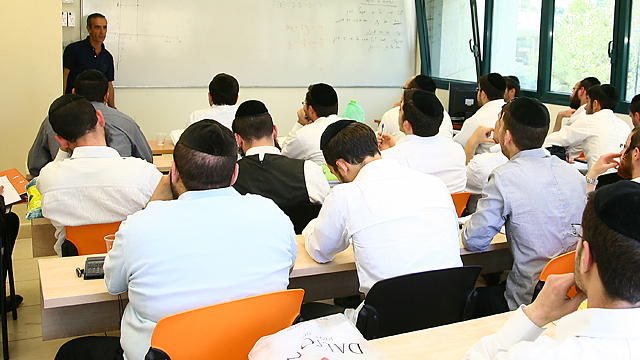
PM Netanyahu and Finance Minister Moshe Kahlon
צילום: אלכס קולומויסקי
Israel's economy strong, gaping inequality remains
2018 OECD report identifies economic gaps, lack of social cohesion and serious challenges for integrating unskilled Arab-Israelis and Haredim into workforce, but highlights ‘remarkable performance with strong growth’, ‘dynamic high-tech sector’, low unemployment rates and general satisfaction with life among Israelis.
Israel’s economy is registering a “remarkable performance with strong growth”, while income inequality is on the decline, but economic gaps and lack of social cohesion continue to prevail in the country, according to a 2018 report published by the Organization for Economic Co-operation (OECD).
“Israel’s economy continues to perform well both in terms of macroeconomic and fiscal outcomes,” the Economic Survey of Israel 2018 summarizes in its conclusions.
Average growth has reached 3.3%, marking a higher progress rate than in many OECD countries—a fact which the report says can be partly attributed to strong population growth, which accounted for half of this impressive increase.
Furthermore, the country’s “dynamic high-tech sector” has bolstered Israel’s external standing.
The findings of the survey, presented in Jerusalem by OECD Acting Chief Economist Alvaro Pereira, Shai Babad, Director General of the Ministry of Finance and Yoel Naveh, Chief Economist, also indicate that the coming year year will likely yield further healthy growth rates of around 3.5 per cent.
The report notes Israel’s “prudent” financial policy and comparatively low and dropping public debt, while highlighting that the average standard of living is improving thanks to higher employment rates.
As a result, the general satisfaction among the Israeli public with their lives when compared to the other 34 OECD countries is high.
Despite the glistening report, however, not all can be presented as gold by Israel's economic leaders. Indeed, inequality—a common grievance voiced by Israelis—remains a problem in need of a remedy.
“Further reforms will be needed to drive down inequality and raise living standards for all Israelis," the report says.
Naveh extolled the fact that “The Israeli economy has grown faster and more consistently than nearly any other in the OECD for the past 15 years.”
Unemployment, he said, is at historically low levels, “and the rise in people with jobs has had a significant impact on the continuing convergence of living standards in Israel with those in the most advanced economies.”
However, some groups composing a significant proportion of Israel’s demographics, are in serious need of governmental attention.
“Crucial” measures are required to integrate into the workforce groups who are considered more than others to be economically marginalized such as Israeli-Arabs, ultra-Orthodox Jews and Haredim.
The groups, the report points out, contribute to Israel’s high poverty rates and low productivity, a problem that demands improved social and labor market integration, particularly since by 2059 they are forecast to constitute half of the overall population.
“Enhancing training and education for Israeli-Arabs and Haredim will be essential to improve their economic opportunities and make future growth more sustainable,” the report said. “Reforms and more public investment in education would develop their skills, allowing them to find well-paid jobs in high value-added sectors.”
Despite the recorded rapid employment growth which has boosted income for the poor and improved the lives of disadvantaged groups, the share of working poor, notably Israeli-Arabs and Haredim, spiked because many are in low-paid jobs due to their limited skill sets.
Moreover, low social transfers—social assistance provided by public and civic bodies to those living in poverty or in danger of falling into poverty—indicate that the families, often large among these communities, face deprivations that contribute to the child poverty rates.
Other shortcomings in the Israeli economy were also noted. Frequent road congestion in Israel could be addressed, the survey suggests, by dedicating more effort and resources into the country’s infrastructure deficit, especially public transport.
This, in turn, would also improve Israel’s “poor air quality while improving access to the labour market, particularly for disadvantaged groups living in peripheral zones.”
Reforms in education, infrastructure and product markets will strengthen the social economic and productivity, the survey predicted.












